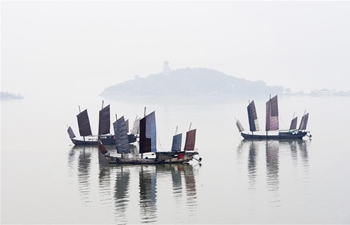ADDIS ABABA, April 17 (Xinhua) -- Tezeru Adeba, who leads local efforts in the immunization of children in a rural town in central Ethiopia, reckons the hardships local healthcare personnel endured to protect their children from chronic healthcare perils before a Chinese company set up innovative devices.
Even though some 35 health posts were established over the past years across small towns in Lume District of Ethiopia's largest Oromia regional state, some 100 km South of Ethiopia's capital Addis Ababa, Adeba said that a lack of adequate electricity supply in the area had posed a major challenge.
The situation has affected the vaccination of local children to cope with deadly diseases including Tuberculosis (TB), Malaria, and Polio, among others.
"We have tried various ways to effectively protect children's health through timely vaccination services," said Adeba, who is also Mother and Children Health Coordinator of the district.
She called for concerted efforts by the Ethiopian government and its partners so as to sustain the safety of children from various diseases.
"Despite the different attempts, none of the initiatives were able to mitigate the serious challenge posed by power-shortage," Adeba told Xinhua on Wednesday.
"Power-interruption for just a short period of time while the vaccines were stored inside a refrigerator at the health posts often forced us to discard the much-needed vaccines imported from abroad with higher government expenditure," she added.
Frustrated by the huge waste of important vaccines, the local government had also applied various safety measures, which include storing vaccines in major towns of the district, where relatively better power supply was available.
The move, however, created another challenge on residents as they were forced to travel miles to vaccinate their children on a monthly basis.
"We are 45 km from the nearest city," said Mulunesh Herma, resident of Tiliti Gerbi town, as she described the huge challenge she had to undergo to vaccinate her child.
"Many people often tend to stay home and abandon vaccinating their children due to the difficulty in accessing the access," she added.
"It was very discouraging as we were not able to immunize the vulnerable children due to power-shortage, while the vaccines were already available," Adeba said.
According to the UN Children's Fund (UNICEF), despite Ethiopia's significant improvements over the past decades, only 38.5 percent of children between 12 and 23 months receive all basic vaccinations.
UNICEF, which revealed "great disparities in terms of access to vaccination services between rural and urban areas," also advised that one of the key strategies to improve access and utilization of immunization services is to improve the cold chain system, especially at the health post level.
While Adeba and other local government officials consider access to uninterrupted power supply, which requires huge investment, the only option to solve the daunting challenge, the installation of high-end vaccine refrigerators that operate solely with solar power have now solved the huge burden.
"The huge burden is now a distant reality," Adeba said, adding mothers in our area are relieved from commuting long distance to vaccinate their children.
The Solar Direct Drive (SDD) vaccine refrigerators - an innovation of the Haier Biomedical Ltd. Company, under the Chinese multinational consumer electronics and home appliances giant Haier Group Corporation -is now considered as an "ideal solution" for thousands of healthcare facilities across the East African country.
The Chinese biomedical company, in partnership with its Ethiopian partner Gedion Alula General Trading Company, also provided delivery of spare parts, training of supply chain and immunization focal persons both at federal and regional levels, as well as 10 years of warranty for its products, company representative Wang Wenming told Xinhua.
Officials of Gedion Alula General Trading Company, an Ethiopian company which installs Haier's high-end SDD products throughout the East African country, told Xinhua on Wednesday that "Haier products are constantly witnessing the user experience."
"We have so far provided 4,000 Haier vaccine refrigerators, with the potential of benefiting close to 5 million families and 15 million people," said Kassa Hailegiorgis, general manager of the company.
In addition to its innovative solar vaccine refrigerators, Haier also engages through awareness creation endeavors in an effort to create awareness on the importance of vaccination for local community members.
Solomon Chale, Head of Selam Children's Village in Oromia regional state, who noted local community's "weak" awareness concerning the importance of vaccination, said that Haier has been helpful through the provision of technical courses for students at the village.
"Now students know the benefits of vaccination," Chale said.













